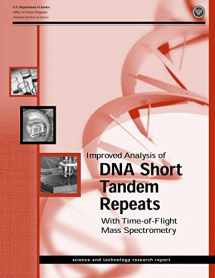
Improved Analysis of DNA Short Tandem Repeats With Time-of-Flight Mass Spectrometry
Book details
Summary
Description
The advent of DNA typing and its use for human identity testing has revolutionized law enforcement investigations in recent years by allowing forensic laboratories to match suspects with minuscule amounts of biological evidence from a crime scene. Equally important is the use of DNA to exclude suspects who were not involved in a crime or to identify human remains in an accident. The past decade has seen numerous advances in the DNA testing procedures, most notably among them the development of PCR (polymerase chain reaction)-based DNA typing methods. Technologies for measuring DNA variations, both length and sequence polymorphisms, have also advanced rapidly in the past decade. The time needed to determine a sample's DNA profile has dropped from 6-8 weeks to 1-2 days, and with more recent advancements, the time needed to process samples may decrease to as little as a few hours, maybe even a few minutes. Simultaneous with the evolution of DNA markers and technologies embraced by the forensic community has been the acceptance and use of DNA typing information. All 50 States now have laws requiring DNA typing of convicted offenders, typically for violent crimes such as rape or homicide. While the law enforcement community is gearing up to gather millions of DNA samples from convicted felons, the DNA typing technology needs improvement. Large backlogs of samples exist today due to the high cost of performing the DNA testing and limited capabilities in forensic laboratories. A need exists for more rapid and cost-effective methods for high-throughput DNA analysis to process samples currently being gathered for large criminal DNA databases around the world. While larger numbers of samples can be processed by increasing the number of laboratory personnel and instruments, the development of high-throughput DNA processing technologies promises to be more cost effective in the long run, especially for the generation of large DNA databases. GeneTrace Systems, Inc., a small biotechnology company located in Alameda, California, has developed high-throughput DNA analysis capabilities using time-of-flight mass spectrometry coupled with parallel sample preparation on a robotic workstation. The GeneTrace technology allows several thousand samples to be processed daily. DNA samples can be analyzed in seconds, rather than minutes or hours, and with improved accuracy compared with conventional electrophoresis methods. Overall, the mass spectrometry method described in this study is two orders of magnitude faster in sample processing time than conventional techniques. This NIJ project was initiated to adapt the GeneTrace technology to human identity DNA markers commonly used by forensic DNA laboratories, specifically short tandem repeat (STR) markers. An extension of the original grant was submitted in December 1997 to fund the development of single nucleotide polymorphism (SNP) markers from mitochondrial DNA and the Y chromosome. Based on the results obtained in this study, the authors believe mass spectrometry can be a useful and effective means for high-throughput DNA analysis, and that it has the capabilities to meet the needs of the forensic DNA community for offender DNA databases. However, due to limited resources and a perceived difficulty to enter the forensic DNA market, GeneTrace made a business decision to not pursue this market. While the STR milestones on the original grant were met, only the initial milestones were achieved on the SNP portion of the NIJ grant because of the premature termination on the part of GeneTrace. GeneTrace Systems, Inc., developed an integrated high-throughput DNA analysis system involving the use of proprietary chemistry, robotic sample manipulation, and time-of-flight mass spectrometry. The purpose of this NIJ project was to apply the GeneTrace technology to improve the analysis of STR markers commonly used in forensic DNA laboratories.


We would LOVE it if you could help us and other readers by reviewing the book
Book review



